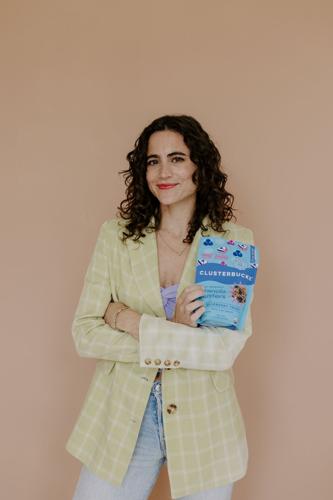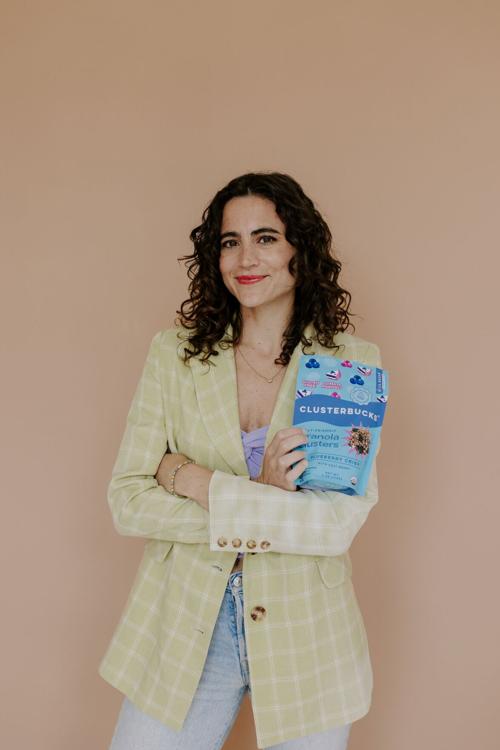Emily Griffith is the founder of Lil Bucks, a Tucson-based food products company that is impacting the food and agriculture industries. Griffith founded Lil Bucks seven years ago, and her vision is transformative for both industries.
Griffith was living in Australia and loving sprouted buckwheat seeds as part of her daily diet. The seeds are a crunchy, tasty, grain free substitute for granola. Being a low-glycemic substitute, buckwheat seeds provide sustainable energy without hitting one’s blood sugar.
After moving back to the U.S., Griffith discovered that there were no buckwheat products. In the U.S., buckwheat is almost 100% imported in a processed food form, found in products such as Soba noodles. Buckwheat in its original most healthy form as a sprouted seed was not available.
For Griffith, the entrepreneurial wheels started turning. It’s rare when new, untapped market opportunities get discovered. And when they are found, these new opportunities are almost always technology related; new tech, or markedly improved tech.
Buckwheat is old school. Originally harvested as a food product around 6000 BCE, buckwheat has been around awhile. It has been a staple in diets around the world, except in the U.S. Hence, the new untapped market opportunity.
When you hear the name buckwheat you immediately think it is a type of wheat. Heck, wheat is in the name. But, it is not. As Wikipedia describes it, buckwheat is not closely related to wheat. Buckwheat is not a cereal, nor is it even a member of the grass family. Buckwheat is a flowering plant cultivated for its seeds.
Buckwheat is gluten free and grain free. It is high in fiber and heart healthy, with 74% more antioxidants than comparative products.
Buckwheat is good for the soil. It is known as a cover crop. These are plants used to cover the soil rather than for the purpose of being harvested. Cover crops manage soil erosion, soil fertility, soil quality, water, weeds, pests, diseases, biodiversity and wildlife.
Most of the buckwheat in the world comes from three countries. Russia produces 55%, China 22% and Ukraine 7%. The little bit of Buckwheat grown in the U.S. is exported to China.
Griffith’s first step was to reach out to farmers in Minnesota. Her question: would you like to grow buckwheat? Her pitch was to organically grow buckwheat and harvest it for its seeds.
There was a desire on the part of farmers because of the regenerative nature of this cover crop. It was soil friendly and a new revenue stream.
Around 2016, working with the farmers and a dedicated team, Griffith produced her first product, Lil Bucks, which she brought to market in 2018 throughout the Chicago area. Sprouted buckwheat seeds used as a crunchy topping for just about anything. The first two years were bootstrapped with revenue from selling Lil Bucks at fitness festivals and fairs, and an eCommerce website.
Momentum really began to build when Whole Foods agreed to stock Lil Bucks in 40 stores. This was in 2020, and the business had some real traction. Then COVID hit and it all came to a grinding halt.
In 2021, Griffith sought help by joining a food and beverage accelerator in the Chicago area. She added a new product called Clusterbucks, which is buckwheat granola clusters in multiple flavors. These innovative moves produced three positive outcomes:
- Friends and family funding, followed by a crowd funding round of financing
- Expansion to Whole Foods across the country
- Greater interest from farmers, and thousands of acres now used for growing buckwheat
Griffith relocated to Tucson from Chicago in 2021 and continued to grow. Her continued success paved the way for three additional milestones:
- A Series A round of financing
- Engaging with Maria Scarangella of Scarangella Consulting, who is a mentor and executive coach helping guide the business to the next level
- Hiring/partnering with Kailey Donewald as the chief of operations for the business. Donewald is a Tucson-based entrepreneur who has a broad understanding of the food industry.

Emily Griffith, right, has partnered with Kailey Donewald, Lil Bucks' chief of operations.
Griffith is on the way to building Lil Bucks into America’s buckwheat brand. There is a new retail line of products due for introduction in 2025. They are expanding their outreach and distribution with a new food service line for restaurants and schools. And, Griffith is continuing to engage more farmers throughout the Midwest who are growing buckwheat. She is also in conversations with farmers in Arizona.
What began in Australia as a personal love for buckwheat is now a Tucson-based transformative food company. Griffith and Lil Bucks are creating in the U.S. new markets for products that are derived from a very old flowering plant. Lil Bucks is also transforming agriculture with new revenue streams and regenerative, organic farming opportunities.
Griffith represents entrepreneurism in its best form. A passion leading to a unique product that delivers value to consumers.
To learn more about the venture, visit lovelilbucks.com.
Losing weight can be difficult for a number of reasons, including fad diets that do more harm than good. Dr Charlotte Norton, Chief Medical Officer of The Slimming Clinic, the UK's largest online weight loss clinic, explains how you could be holding yourself back. Buying low-fat products. Reaching for the low-fat products in the supermarket is a "huge mistake", according to Dr Norton. "Whilst many of these products may be low in fat, they're full of sugar to compensate.






